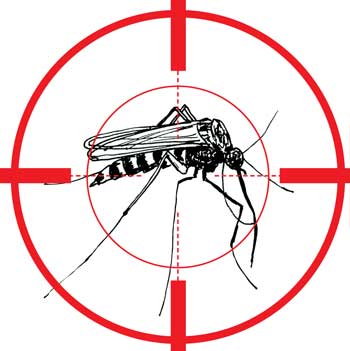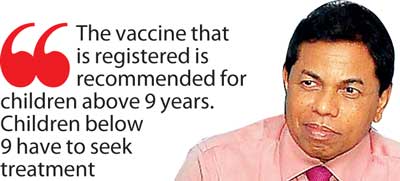Reply To:
Name - Reply Comment
Last Updated : 2024-04-20 20:10:00
Dengue is a dangerous.
It is pandemic and has become a terror in many sub-tropical and tropical countries of the world.
Especially after the heavy rains and floods, Sri Lanka has become a country, which is gravely affected by this deadly disease. However, in the recent past the country has carried out many programmes towards eradication and prevention of dengue, such as awareness programmes for the public, regular fumigation, and upgrading skills in hospitals in regards to dengue management.
Though significant strides have been taken to combat the vector-borne, it is still rampant in the country.

More than 500 dengue patients had been admitted daily and during the last six months, 18, 735 suspected dengue cases have been reported to the Epidemiology Unit from all over the island.
Approximately 49.21 percent of dengue cases were reported from the Western Province. Therefore the implementation of a dengue vaccine can be seen as an efficacious and infallible measure to completely eradicate the disease from Sri Lanka.
The First Licensed Dengue Vaccine
According to the WHO, CYD-TDV (Dengvaxia®) by Sanofi Pasteur is the first dengue vaccine to be licensed.
It was first licensed in Mexico in December 2015 for use in individuals 9-45 years of age living in endemic areas.
This vaccine has been evaluated in two Phase III clinical trials, which included more than 35,000 participants.
CYD-TDV (Dengvaxia®) has now been licensed by several dengue-endemic countries in Asia and Latin America for use in 9 - 45 or 9 - 60 year-olds, and is under regulatory review in several others.
The WHO stated that approximately five additional dengue vaccine candidates were in clinical development, with two candidates (developed by Butantan and Takeda) began Phase III trials in early 2016.
Ten countries have been selected as trial sites for the phase III trials of the Takeda vaccines and Sri Lanka is the only Asian country to be selected.
Clinical Trials in Sri Lanka
As part of the clinical procedures in developing and licensing their vaccine, Takeda, a research organisation based in the United States and Japan signed an MOU with the Director General of Health Services Dr. Palitha Mahipala.
Accordingly as part of the Phase III trials, the vaccine will be tested on 4,000 schoolchildren in Colombo, where Dengue is predominant.
An Epidemiology Unit Spokesman stated that this was a scientific study before a decision to introduce a vaccine was made.
“If the vaccine is proven to be highly efficacious and safe, then we could make a decision to introduce it in Sri Lanka. There will be a recruiting criteria and one of the criteria is to recruit from schoolchildren as well.

“A substantial number of clinical trials should take place in endemic countries prior to the introduction of a vaccine. Sri Lanka is one of the trial sites and there are other countries involved. This is a global study both in the American and Asian region where Dengue is endemic,” the spokesman said.
Is the vaccine safe?
A spokesman for the Epidemiology Unit said that the Takeda vaccine has already been tested globally on 1500-2000 children as part of Phase II trials. As the vaccine has been proven to be efficacious and safe, the scope of testing has been expanded and 20,000 children globally will be tested.
The spokesman stated that when a vaccine reached Phase III trials, safety had already been established. The ages of the sample size was similar to the group of children that the vaccine will be used on in the future.
According to the Epidemiology Unit the vaccine developed incorporated all four serotypes (A serologically distinguishable strain of a microorganism) into it.
One particular serotype has been purified and the other three serotypes have been incorporated. Therefore, the recipient is expected to develop immunity against all four dengue viruses.
Phase III trial
The spokesman stated that the Phase III trial was the last hurdle before registration.
“It is a large scale trial and this is where the efficacy of the vaccine is truly tested. A control experiment is carried out at the same time to discern the efficiency of the disease. Since there is a vaccine that is already registered, the control sample will be given a placebo. But none of the volunteers will know, who was given the placebo or who was given the registered vaccine. This is called a double blind test and it will ensure the validity of the trial.”
He added that blood samples of those in trial would be examined to check the level of immunity given by the vaccine.
“Ideally if the vaccine is 100 percent effective, no one should get dengue in that group. However, since there are four serotypes, dengue is an extremely complex disease.
“No vaccine can give 100 percent immunity from the disease. But once infected, natural immunity lasts lifelong. If you are infected with one of the serotypes, you are immune to that serotype in the future, but you will be not immune to the three other three serotypes.
“It should also be noted that usually when you are infected the second time with another serotype, it is much worse than the first time.”
Challenges
“Phase I and Phase II are pre-clinical trials and are often tested on animals. Usually in other diseases animals contract the disease once the virus is injected in to them. But when it comes to dengue there’s no animal model as dengue is a human disease that doesn’t affect any other mammal or animal. This was why it took so long for a vaccine to be produced,” said the Spokesman.
“Natural immunity gave rise to the thought of a vaccine. Yet, unlike measles or chickenpox, dengue virus is complex as it has four serotypes. So, we need to have a vaccine against all these four serotypes. This is an arduous task and after 75 years of research, we see only one vaccine registered,” he added.
Introducing a vaccine in Sri Lanka
“There is a three tier decision making process in Sri Lanka before a vaccine is finally introduced. Firstly, the vaccine has to be registered by the NMRA (The National Medicines Regulatory Authority) in the country.
“Here vaccinologists, pharmacologists and epidemiologists will be asked to review the vaccine profile.
“Secondly, the national programme has to make a decision as to whether this vaccine could be incorporated into our immunization programme.
“The third tier includes an operational research, where a relatively small group of people would be given the vaccine to see if the vaccine is immunogenic and safe,” said the Spokesman.
He added that the operational research would examine whether children developed any side effects and whether the vaccine could beat strains unique to Sri Lanka.
“Subsequently the research results will be examined by a panel of experts and a decision will be made. Even the Takeda vaccine will have to go through this three tier process after the phase III trials,” he noted.
He stated that there were three main mechanisms to eradicate dengue- vaccination, clinical management and prevention of dengue transmission.
“Vaccine is a preventive mechanism. But there are other strategies that we need to work on. When young children and adults fall sick with fever, we need to immediately check the cause of fever. One cause of fever could be dengue.People should not go for self-medication, such as pain killers and unconventional means of medication, because such methods have not been tested in the same magnitude as the standardized method of treatment,” he said.
He elaborated on how the vaccine would be administered.
“In Sri Lanka both children and adults are affected by dengue. The present vaccine that is registered is recommended for children above 9 years. Children below 9 years have to seek treatment. Therefore their medical care has to be of good quality.

Add comment
Comments will be edited (grammar, spelling and slang) and authorized at the discretion of Daily Mirror online. The website also has the right not to publish selected comments.
Reply To:
Name - Reply Comment
On March 26, a couple arriving from Thailand was arrested with 88 live animal
According to villagers from Naula-Moragolla out of 105 families 80 can afford
Is the situation in Sri Lanka so grim that locals harbour hope that they coul
A recent post on social media revealed that three purple-faced langurs near t